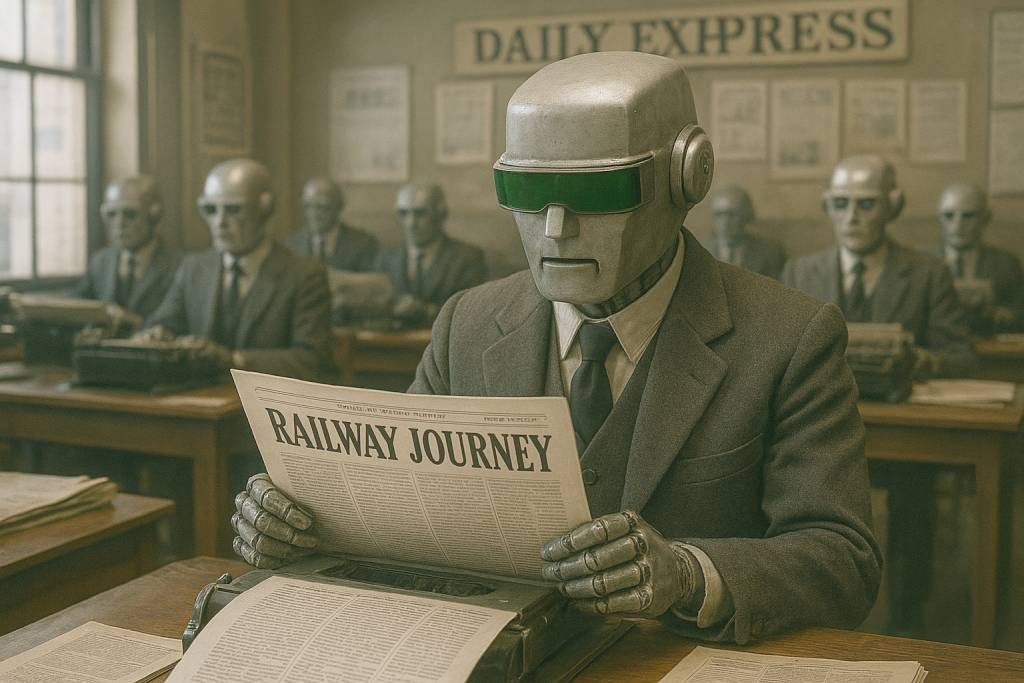Latest threat to copyright is ‘AI’ rewrites
THE EXPRESS has offered a freelance journalist compensation for lifting a feature from the Telegraph. The first twist is that the offer was a mere £100. The second is that the Press Gazette reports that the Express very likely used an “artificial intelligence” tool to rewrite it.

A photo-realistic image of a robot sub-editor wearing a green eye-shade re-writing an article about a railway journey, in the Daily Express newspaper office, full of robot journalists, according to ChatGPT
Daniel Puddicombe's 1300-word feature “The Mexican coast-to-coast train that costs just £25 – and is run by marines" was published in the Telegraph on 12 October. On 18 October the Express published 715 words under the headline “The incredible 188 mile train journey connecting 2 seaside cities in gorgeous country”.
As Daniel told the Press Gazette, he is “the first and only non-Mexican journalist who travelled on that railway line and to have been in contact with the military and the Navy... There is absolutely no chance that anybody else could have done that.”
The Press Gazette fed both stories into AI text-detector Pangram, which claims “up to 99% accuracy”. The system said it had high confidence the Telegraph piece was human-written, and high confidence the Daily Express piece was written by AI.
Daniel declined the £100 offer, describing it as an “insult” and as “less than one third” of what he was paid per article. The Freelance is attempting to contact him about what happens next.
We can offer one strong tip to sub-editors, human or not: never, ever assume that anyone who is enthusiastic about railway travel lacks a grasp of detail. As Daniel noted, the Express article is ”full of errors... the lead image doesn’t show the right train.”
Meanwhile in Whitehall...
The UK government is tight-lipped about its plans to permit the owners of so-called “artificial intelligences” to scrape your words and images. In July it responded to powerful protests against its plan to give our work to robots by announcing reports on the effects of its proposals. It is in the process of setting up “technical working groups” to examine those effects.
In a regular consultative meeting with the British Copyright Council in November representatives of the government's Intellectual Property Office were tight-lipped - or, as civil servants prefer to say, “in listening mode”.
The Freelance has long observed that, if you are in government, the huge advantage of convening an inquiry or commissioning a report is that it gives you the chance to say “no comment” until it reports.
...and a random sampling from the courts
Court cases against “AI” companies proceed apace. Image library Getty lost its copyright claims in the UK: see here. In Germany on 11 November the Munich regional court ruled that ChatGPT infringed songwriters' copyright by ingesting their lyrics. In Canada an Ontario court ruled on 7 November that a case brought by a group of Canadian media companies can proceed there; the defendant, ChatGPT owner OpenAI, had wanted it moved to the US.
Deals continue too. For example AI-powered news platform Particle on 27 October announced the Observer - into which Tortoise Media notoriously reversed earlier in the year - as its first UK partner to “innovate news consumption”. And on 29 October Universal Music announced that it had settled a claim against artificial music generator Udio and would “collaborate on an innovative, new commercial music creation, consumption and streaming experience... trained on authorized and licensed music.”. The announcement implies, but does not specify, that artists will be paid.
 'Artificial Intelligence' our coverage to date
'Artificial Intelligence' our coverage to date
![[Freelance]](../gif/fl3H.png)